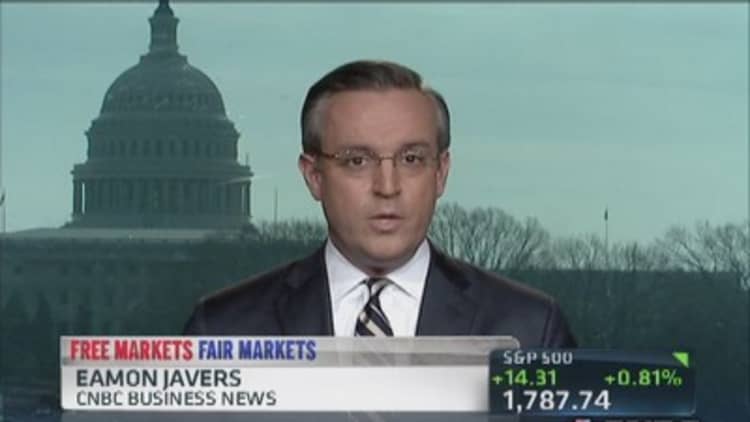U.S. securities regulators are studying whether more proprietary high-speed trading firms should register as broker-dealers, which would subject them to greater oversight, a U.S. Securities and Exchange Commission official said on Friday.
Speaking at the Practicing Law Institute's annual SEC Speaks conference, John Ramsay, the outgoing acting director of the SEC's Trading and Markets Division, said that whether certain high-speed proprietary trading firms should be formally registered as brokers "is something we are looking at carefully."
High-frequency trading has come under more regulatory scrutiny over the past few years, in what has become part of a broader debate over whether the SEC's market structure rules are in need of a major overhaul.
Lightning-fast traders grabbed even more attention following the May 6, 2010 "flash crash," when the Dow Jones Industrial Average plunged more than 700 points before rebounding.
High-speed traders did not cause the crash. However, many hit the exits when the market soured, drying up liquidity and deepening the plunge.
(Read more: )
There is no clear definition of high-speed trading, making any rule-writing difficult. The rapid turnover of security holdings, especially the amount of securities held overnight, would likely be a key determinant.
Since the flash crash, some have since called for greater rules for high-speed traders, such as requiring them to act in a more formal capacity as market-makers, which help match buyers and sellers.
If more proprietary firms ultimately registered as broker-dealers, this could eventually put them on a path toward becoming designated market-makers.
Moreover, it would also subject them to the SEC and the Financial Industry Regulatory Authority's examination powers, which would mean they would need to open up their books to regulators on a routine basis.
(Read more: SEC targets'tick size' pilot for small cap stocks)
Whether or not a high-speed trader should register as a broker-dealer depends on a number of factors, Ramsay later told reporters on the sidelines of the conference.

If the firms are out "in the market on pretty much a continuous basis" and "if they are providing quotes to other participants," Ramsay said, "then they look like firms that are registered and are required to be registered."
Tick size pilot also coming
There is not any formal rule-making in the works specifically targeting high-speed traders, largely because the SEC is still studying market data to see if new rules are even needed.
But on Friday SEC Chair Mary Jo White announced that the agency will proceed with another market structure initiative: a test program to allow the stocks of small-cap companies to trade in wider increments.
The "tick size" pilot will "widen the quoting and trading increments and test, among other things, whether a change like this improves liquidity and market quality," White said.
(Read more: Buffett firm cuts feeds to speed traders)
The SEC has been mulling over whether to do a pilot program ever since it completed a study on the issue that was required by the 2012 Jumpstart Our Business Startups, or JOBS Act, which loosens securities rules to help small businesses raise capital.
In 2001, the SEC required so-called decimalization, in which all listed stocks must be traded and quoted in one-penny increments instead of in fractional increments such as one-sixteenth of a dollar.
But Congress wanted the SEC to revisit this pricing amid concerns it may be harming the liquidity of smaller companies.
—Reuters

